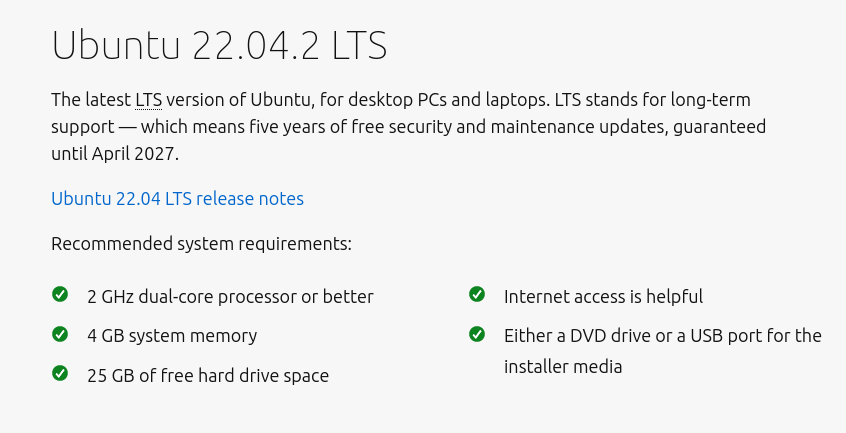Anyone know minimum requirements to run Ubuntu. The main flavor as well as any other you want to share. Also, suggest any other distrio for a 15 year old laptop. Thanks.

4gb is not enough lmao
I’d say go with opensuse tumbleweed/stable if you have ram
Arch+lxde if you do not.
If you want even better options, they exist.
It would be useful to share hardware specs so that we can really recommend something for it. You will get best results by trying out multiple distributions and get a feel. Generally, almost any linux will do, problem will be browser so saving as much ram for it would be useful.
First suggestion: get some used SSD for it if it does not have it already (even 64GB will do), second get more RAM if possible.
Depending on the user I would first go with Linux Mint XFCE, that is lightest easy to use distro I have found.
For someone more advanced/less expectations Crunchbang++ is very light.
Generally, almost any linux will do
That really depends on the hardware. A year or two ago a friend asked me to install Linux on his ancient laptop. If I remember correctly it has x86 BIOS and CPU, or a x86 bios and x86_64 CPU.
In any case, it had a hardware combination that made it next to impossible to find a distro that supports it. I tried a few Debian derivatives, arch, void, maybe fedora, and some distros I found in top 10 distro lists for old PCs. The only one that I got to both install and boot was Bodhi Linux. Never heard about it before or after, and it gave up on updating like half a year later.
sounds like some of those asus transformer devices :D
in that case your problem isn’t so much finding a distro to support that PC, but getting ANY distro to boot on it. It’s possible and takes pretty much the same steps for any distro - it’s just a horrible task for all cases.
did it have 32bit cpu by any chance?. since linux stopped supporting it a while ago. if its 64 bit its fine i think
Linux hasn’t stopped supporting 32-bit. I’m currently running Debian on an old 32-bit netbook just fine.
I shared specs on another comment. Let me share link. https://lemmy.fmhy.ml/comment/310020 I’m still learning Lemmy, so I’m not sure if it will link properly. Basically Tl;Dr: maybe 32 bit 8GB 1.8 or 2.2 GHz i3 maybe first gen. I’m currently waiting on ssd.
Link is showing some other comment, but I think you got nice suggestions in the thread.
Try out multiple distros, depending on experience and easines of use you expect.
Go with 32bit even if cpu is 64bit (which looks it is not) sinc it will use a bit less RAM.
I think you can make usable experience, I have i5 second gen with 10GB of ram (with gentoo, but Mint XFCE runs nicely too).
Good luck and update us on experience!
I use MX Linux on an EeePC netbook that’s super low power and 32 bit. It’s not fast but it’s definitely useable.
I use MX Linux on a 13 year old i5 laptop and is a very useable experience. Used antix before on a less powerful laptop (don’t remember the specs) and was fine too but prefer MX as an everyday experience.
I hope you have ssd and maxed out ram. 15 years is Core2Duo right?
Try HaikuOS, KolibriOS and the third option could be Ubuntu or Kubuntu. I’m sure Gnome and Kde will run just fine, but lxqt is marketed as the ost lighweight Linux DE.
But try Haiku and Kolibri for real even they don’t run on Linux Kernel.
Yes I will give it ssd and yes it has max RAM. We’ll see how it will do. Waiting on ssd.
You can put Ubuntu on a 15 year old laptop, but it will be extremely slow. Lubuntu or Xubuntu would better suit the laptop.
Try Lubuntu! It’s the light version of Ubuntu. I ran it on a netbook from 2010. You’ll be fine.
If you have more than 4GB of RAM you can install most distros. If not, I’d list my specs, especially the RAM.
Also, IMO, it’s less the distro itself. It’s more what DE (desktop environment) you choose. The DE is a set of preograms that responsible for the graphical part (like the taskbar, icons, settings).
The distro only help to save you the time/effort changing DE.
Anyways, distros:
x32: Zorin Lite 32bit (little older), Puppy Linux, Bodhi Linux, antiX, Lubuntu, Xubuntu, PeppermintOS, MX Linux.
x64: ZorinOS Lite, Ubuntu MATE, PeppermintOS, Linux Lite.
DEs: LXDE, LXQt, XFCE.
KDE is light-ish (new versions only).
I’d recommend you to stay away from Gnome.
Apparently I answered the first half only in my head…
An external site claims that those are the requirements to 22.04:
• 2 GHz dual core processor
• 4 GiB RAM
• 25 GB of hard drive space
• VGA capable of 1024×768 screen resolution
2 GHz dual-core processor or better, 4 GB system memory, 25 GB of free hard drive space (per official documentation)
The main Ubuntu flavor is pretty heavy since it uses GNOME, you are better off running Lubuntu, Xubuntu or Ubuntu Mate. For very low end hardware you could use something like antiX.
I’ve never used Ubuntu, but I used Debian for a while and the Mate desktop and highly recommend Mate.
Ive used Lubuntu on old machines in the age range OP is asking and its great. Turns a 2011 Macbook into a functional machine, had what felt like out-of-the-box performance.
That being said, the best performance gains from laptops can honestly just be a good cleaning. Cat hair and dust in machines that are hot day 1 can add up and send your CPU into “please help me” mode.
A lot of it will come down to what you’re running for a desktop environment and software. I’ve got an old laptop with a duel core 2Ghz (x86_64) processor and 2G of ram, and running Debian with XFCE it can do basic web browsing, video playing/streaming up to ~720p, game emulators, etc with the same snappiness as a normal computer.
Ubuntu is a bit bulkier than Debian and some other Debian derivatives, so if you go with Ubuntu you’d probably make sure to go with a more lightweight ‘flavor’ with a non-gnome desktop and remove anything you don’t need.
Alpine and Puppy Linux are two other super lightweight distros that also might be worth checking out (albeit Alpine being a little more advanced and Puppy Linux being a bit limited).
I think the bottleneck is going to be “anything graphical” - most linux distros can be installed in “minimal” mode with just basic system - I’d start from there, so for me it would be Debian 12 with the “minimal CD” (https://www.debian.org/CD/netinst/) - but this of course depends on how well supported the network card on your laptop is.
Then add some lightweight window manager (so not Gnome or KDE), like bspwn (https://github.com/baskerville/bspwm).
Don’t go for Chrome/Firefox - perhaps something like Vivaldi (though this will most likely be the “resource hog” regardless).
Then add the software you need.
Ubuntu, due to the Gnome desktop, might not be the best choice here. Can you share the laptop’s specs? If it is 32 bit only, this limits your options considerably. With the few information so far, I’d suggest anything with LXDE or XFCE as a desktop environment, if you’re feeling fancy, you can even go for tiling window manager like i3 or sway. Distro itself… Debian? Arch? Depends mainly on your skillset and preference, you might have to do some modification by yourself (so bring some basic Linux skills)
Pretty much any Linux distro is so light you should worry about browser minimum requirements instead.
I run it on a raspberry pi, so I’d say pretty low.
I’m running Gentoo on a 15-year-old laptop (HP Pavilion from 2008, Athlonx2 1.7GHz, 2GB RAM, 100GB HDD), but that’s only practical if you’re willing to let it compile things overnight. Anyway, based on my experience, you’ll get a workable machine out of it, but large programs like modern web browsers will have a certain amount of startup lag.
If your laptop has a 64-bit CPU, any standard distro will probably work. If it’s a 32-bit CPU, you’ll need a distro that still supports that, of which Debian is probably the most popular (other options would be openSUSE, Mageia, and, yes, Gentoo). If this laptop was a lower-end machine 15 years ago, you may want to consider Puppy Linux.
You’ll want a lighter or older desktop environment (MATE, TDE, XFCE, LXDE, maybe Lumina) or a plain window manager, as others have said—do not try to install current Gnome or KDE (so the main Ubuntu flavour is not a good choice).
What’s your use case? Like, what are you planning/wanting to do on that computer? If you’re looking for web browser and music playback, virtually any distribution would work. I have a similarly-spec’ed laptop (a quite old unibody macbook) and have managed to do browser/music/ssh with it with no problems, running Debian + LXDE and NixOS + DWM. If you want the “standard desktop experience” then you should probably stay away from the primary Ubuntu distribution with Gnome, and instead go for one of the official spinoffs, like lubuntu or xubuntu. If using Ubuntu as your distribution of choice isn’t a hard requirement, you could also check out other distributions like POP!_OS or a Fedora spin with XFCE, LXDE, or LXQT.
If you want gaming, you might be out of luck unless you have a discrete GPU and limit yourself to fairly old games.
If you’re just starting with Linux I wouldn’t recommend some distributions because of the learning curve. Arch Linux and its derivatives like Manjaro are really appealing to some people but there’s a lot of extra necessary knowledge that could hinder your progress. Ditto Gentoo and Alpine.










